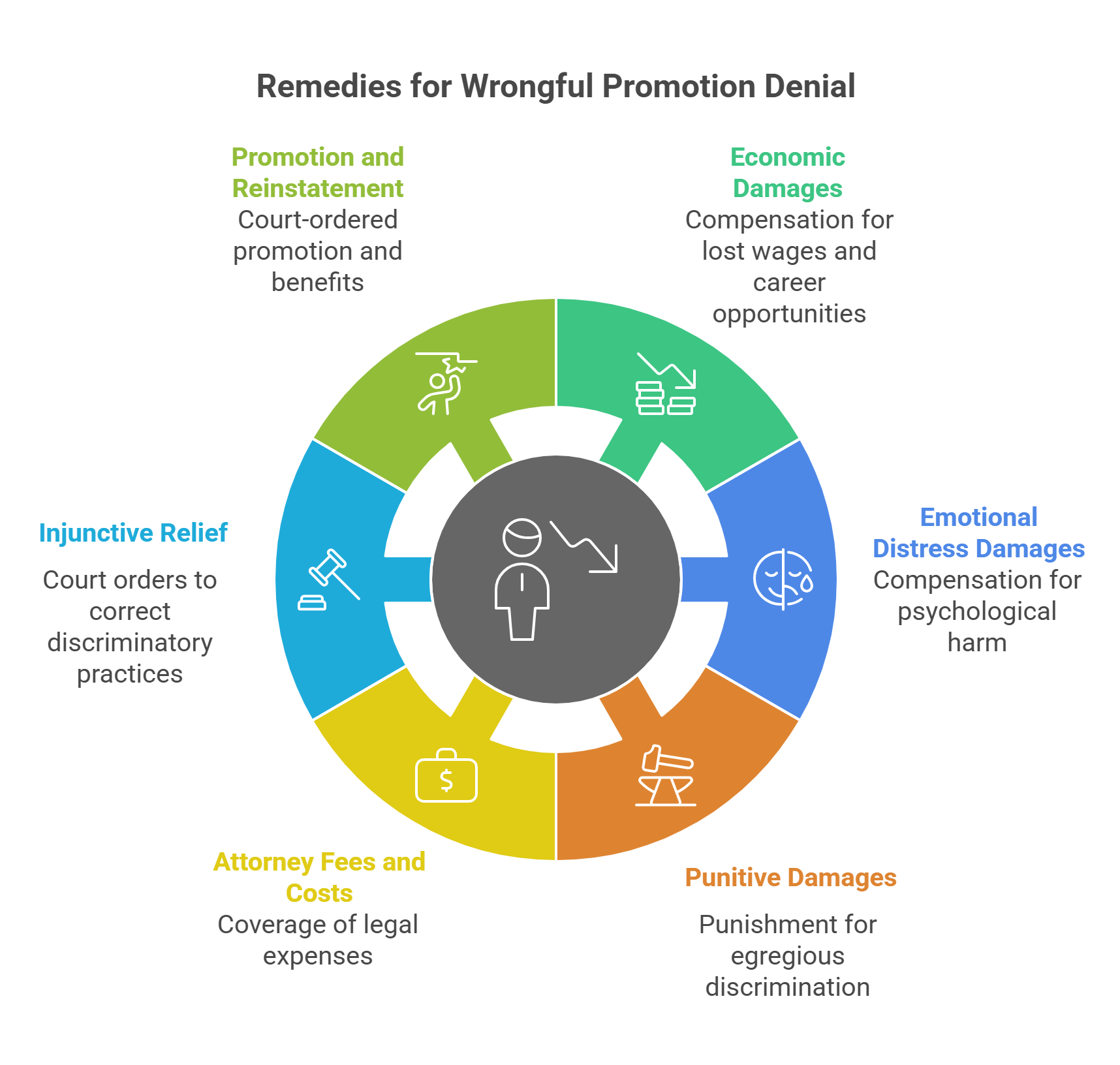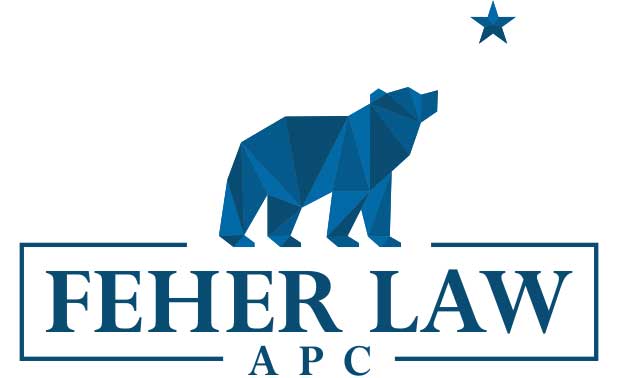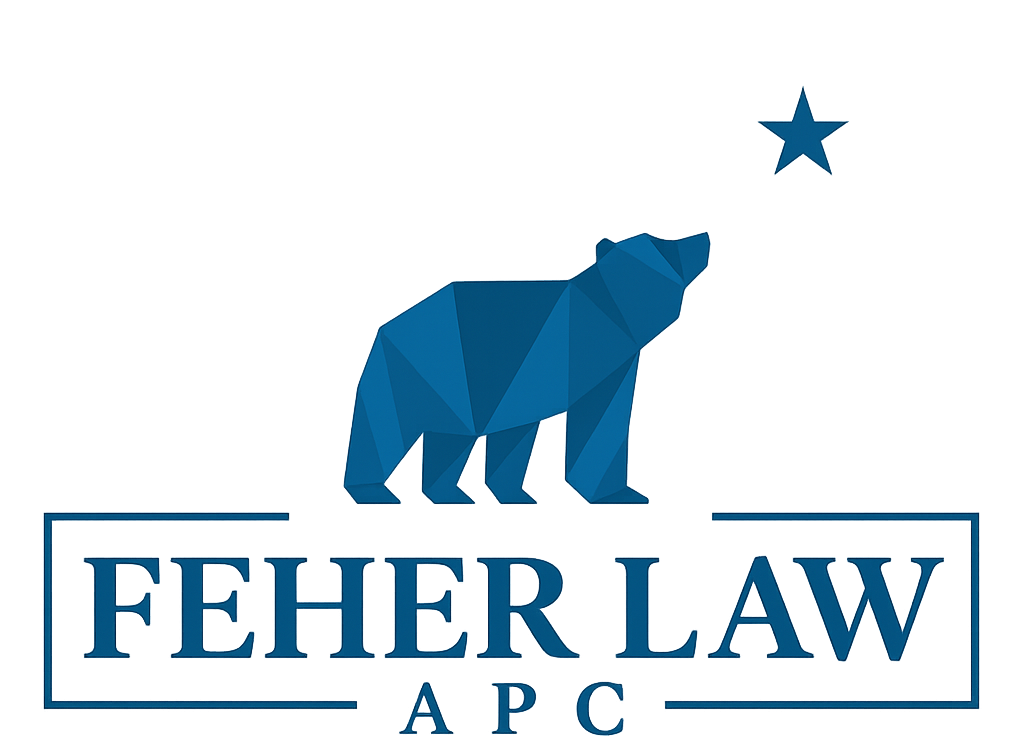Promotion Discrimination in California: Failure to Promote Guide

Getting passed over for a promotion you deserved can feel devastating. You watch as less qualified candidates advance while your hard work goes unrecognized. If you suspect your employer’s decision was based on discrimination rather than merit, you’re not alone, and you have legal rights that protect you from such unfair treatment.
California has some of the strongest employment laws in the nation, explicitly prohibiting discrimination in the workplace based on protected characteristics. Understanding your rights under both federal and state law is key when you’ve been unfairly denied advancement opportunities.
The consequences of inaction can be severe: continued career stagnation, lost income, and watching discriminatory practices continue unchecked.
At Feher Law, we’ve successfully represented California employees who faced promotion discrimination, securing substantial compensation for our clients. Our experience with employment law cases has resulted in significant victories, including:
- $1,000,000: Wrongful Termination settlement in Los Angeles
- $1,400,000: Employment – Wrongful Termination settlement in Los Angeles
- $7,000,000: Civil Rights settlement in Los Angeles
Our California workplace discrimination attorney is available today for a free consultation to help you seek the compensation you deserve.
An Overview of Unfair Promotion Practices in California Workplaces
Unfair promotion practices occur when employers make advancement decisions based on illegal factors rather than legitimate business criteria. Understanding the distinction between lawful and unlawful practices helps employees recognize when their rights have been violated.
Common unfair promotion practices include:
- Discriminatory selection processes: When promotion criteria disproportionately favor certain groups or exclude protected classes. Employers cannot use subjective standards that mask discriminatory intent.
- Retaliation for protected activities: Passing over employees who filed complaints, reported harassment, or exercised their legal rights. This form of adverse action violates both federal and state employment discrimination laws.
- Stereotyping and bias: Making promotion decisions based on assumptions about an employee’s abilities due to their age, gender, race, or other protected characteristics. The Fair Employment and Housing Act (FEHA) explicitly prohibits such discriminatory practices.
- Inconsistent application of standards: When similarly situated employees receive different treatment without legitimate business justification. This often reveals underlying discrimination based on protected class membership.
| Fair Promotion Practices | Unfair Promotion Practices |
|---|---|
| Merit-based selection using objective criteria | Decisions based on protected characteristics |
| Consistent application of promotion standards | Selective enforcement of requirements |
| Documented performance evaluations | Subjective, undocumented assessments |
| Transparent promotion processes | Hidden or arbitrary selection methods |
| Equal opportunity for all qualified candidates | Exclusion of protected class members |
✔️ According to the California Civil Rights Department’s annual reports, thousands of employment-related discrimination complaints are filed each year, with a portion involving allegations of denial of promotion based on protected characteristics.
Protected Classes Under California Employment Law
California’s employment discrimination laws go beyond federal requirements, creating a comprehensive legal framework that safeguards workers’ rights. While Title VII of the Civil Rights Act provides baseline protections, the Fair Employment and Housing Act (FEHA) extends coverage to additional characteristics not included under federal law.
Federal protected classes under the Civil Rights Act and related legislation include race, color, religion, sex, national origin, age (40 and older), and disability. The Age Discrimination in Employment Act specifically protects older employees from discriminatory treatment, while the Americans with Disabilities Act requires reasonable accommodations for qualified individuals with disabilities.
📌 California law provides significantly broader protection than federal statutes, covering sexual orientation, gender identity, marital status, military status, political activities, and status as a domestic violence victim.
Under FEHA, employers cannot discriminate against employees based on ancestry, medical condition, genetic information, or AIDS/HIV status. This comprehensive approach means California workers have stronger legal recourse when facing promotion discrimination than employees in many other states.
The practical impact of these protections is substantial. For example, while federal law only protects workers aged 40 and older from age discrimination, California’s broader interpretation often provides additional remedies.
Similarly, California’s inclusion of sexual orientation and gender identity as protected classes predated federal recognition, demonstrating the state’s commitment to equal employment opportunity.
Understanding these protections helps employees recognize when they’ve experienced unlawful treatment. The provision of broader state protections also means that California employees often have multiple legal avenues to pursue when seeking compensation for discriminatory promotion practices.
If you’ve faced unfair treatment on the job, our Huntington Beach workplace discrimination lawyer is ready to help you understand your rights and fight for the compensation you deserve.
Promotion Discrimination Examples: Real Scenarios in California
Promotional discrimination manifests in various forms across different industries. These examples illustrate how discriminatory practices can affect employees and the legal principles that apply to such situations.
💡 Hypothetical Scenario #1:
A technology company routinely promotes younger employees to management positions while consistently passing over qualified candidates aged 40 and older. Despite strong performance reviews and meeting all qualification requirements, older workers find themselves excluded from advancement opportunities. This pattern suggests that age-based discrimination is prohibited under both federal and California law.
The tech industry has faced particular scrutiny for age discrimination, with companies sometimes favoring younger employees based on assumptions about adaptability or cultural fit. When promotion criteria become a pretext for discrimination based on age, affected employees have legal recourse through both the EEOC and the California Civil Rights Department.
💡 Hypothetical Scenario #2:
A healthcare facility promotes male nurses to supervisory roles at significantly higher rates than equally qualified female nurses. Female employees consistently receive positive evaluations but face barriers to advancement that their male counterparts don’t encounter. The employer’s explanations for promotion decisions lack consistency and appear to reflect gender-based stereotypes about leadership capabilities.
This scenario demonstrates how discrimination in the workplace can persist even in female-dominated professions. When employers apply different standards or make assumptions based on gender, they violate both Title VII and FEHA protections.
💡 Hypothetical Scenario #3:
A government agency systematically excludes employees of certain ethnic backgrounds from promotional opportunities, despite their qualifications and performance. The agency’s promotion process lacks transparency, with decisions made through informal networks that effectively discriminate against protected class members.
Government employers are subject to the same anti-discrimination requirements as private employers. When promotion processes lack objectivity or transparency, they often mask discriminatory intent that violates civil rights protections.
Whether in private industry or public sector employment, the legal framework protects against unfair practices that limit career advancement based on protected characteristics.

How to Prove Failure to Promote: Building Your Case
Building a strong promotion discrimination case requires systematic evidence gathering and careful documentation of discriminatory treatment. The legal framework demands specific types of proof to establish that unlawful discrimination occurred.
Essential steps for proving failure to promote include:
- Document all relevant interactions: Maintain a detailed record of performance evaluations, promotion applications, and communications with supervisors. This documentation becomes key evidence when demonstrating that qualified candidates were passed over for discriminatory reasons.
- Establish your qualifications: Gather evidence showing you met or exceeded the stated promotion criteria. This includes performance reviews, certifications, educational credentials, and any acknowledgments of your work quality from management.
- Identify similarly situated comparators: Document how the employer treated other employees in comparable positions, particularly those outside your protected class who received promotions. This comparative evidence helps establish discriminatory treatment patterns.
- Record discriminatory comments or behavior: Document any statements, jokes, or conduct that reveals discriminatory intent. Even seemingly casual comments can provide powerful evidence of underlying bias affecting promotion decisions.
- Preserve electronic communications: Save emails, text messages, and other digital communications that may contain evidence of discriminatory intent or inconsistent explanations for promotion decisions.
- Track promotion patterns: Analyze the employer’s promotion history to identify systemic discrimination. Statistical evidence showing that protected class members are routinely excluded can strengthen individual claims.
Evidence of discrimination often emerges through careful analysis of the employer’s promotion practices over time. Courts recognize that discrimination rarely involves explicit statements, so circumstantial evidence becomes particularly important in establishing discriminatory intent.
📌 At our firm, we guide clients through the preparation process from the start, ensuring all necessary evidence is gathered before filing a complaint. Administrative agencies and courts require substantial proof in discrimination cases, and our experience helps clients build stronger cases and pursue better outcomes.
The Legal Framework: California Fair Employment and Housing Act (FEHA)
FEHA provides the primary legal framework for addressing promotion discrimination in California, offering broader protections and stronger remedies than federal law. This comprehensive statute prohibits discrimination in the terms and conditions of employment, including promotion decisions.
⚖️ Under FEHA, employees can challenge promotion decisions that appear neutral but have a discriminatory impact on protected classes, even without proof of intentional discrimination.
The burden-shifting analysis in promotion discrimination cases follows a well-established pattern. First, the employee must establish a prima facie case by showing they belong to a protected class, applied for or were considered for promotion, were qualified for the position, and were rejected while the position remained open or was filled by someone outside the protected class.
Once the employee establishes these basic elements, the burden shifts to the employer to articulate legitimate, non-discriminatory reasons for the promotion decision. The employer must demonstrate that their decision was based on lawful factors such as qualifications, experience, or performance rather than protected characteristics.
| Burden of Proof Process in Promotion Discrimination Cases |
|---|
| Stage 1: Employee’s Prima Facie Case |
| • Belongs to a protected class |
| • Applied for/considered for promotion |
| • Met basic qualifications |
| • Position filled by a non-protected class member or remained open |
| Stage 2: Employer’s Response |
| • Must articulate legitimate business reasons |
| • Cannot rely solely on subjective criteria |
| • Must show consistent application of standards |
| Stage 3: Employee’s Rebuttal |
| • Demonstrate the employer’s reasons are pretextual |
| • Show discriminatory intent through direct or circumstantial evidence |
| • Establish a pattern of discriminatory treatment |
If the employer provides legitimate reasons, the burden returns to the employee to show these reasons are pretextual—merely a cover for discriminatory intent. This can be accomplished through evidence showing the employer’s stated reasons lack credibility, were applied inconsistently, or that discriminatory bias influenced the decision.
The California Legislature has consistently strengthened FEHA’s provisions to extend beyond federal protections by covering additional protected classes and providing enhanced remedies. California employees can recover emotional distress damages, punitive damages, and attorney fees, making discrimination claims more viable than under federal law alone.

Filing Your Complaint: The Administrative Process
The administrative process serves as a mandatory first step before pursuing litigation in most promotion discrimination cases. Understanding this process and its timelines is essential for protecting your legal rights.
The complaint filing process involves several critical steps:
- Initial consultation and case evaluation: Meet with our experienced employment attorney to assess the strength of your discrimination claim. This consultation helps determine the best strategy and ensures compliance with legal requirements.
- Prepare and file an administrative complaint: Submit a detailed complaint with the California Civil Rights Department (formerly DFEH) or the Equal Employment Opportunity Commission within the required deadlines. The complaint must specify the discriminatory conduct and identify the protected basis for the claim.
- Participate in agency investigation: Cooperate with investigators by providing documentation, witness information, and testimony. The agency may request additional evidence or conduct interviews with relevant parties.
- Engage in mediation or settlement discussions: Most agencies offer mediation services to resolve discrimination complaints without litigation. This process can result in monetary compensation and policy changes to prevent future discrimination.
- Receive agency determination: After investigation, the agency will either find reasonable cause to believe discrimination occurred or issue a no-cause determination. Both outcomes preserve your right to pursue private litigation.
- Obtain right-to-sue notice: If the agency cannot resolve the matter, you’ll receive authorization to file a civil lawsuit in state or federal courts within specified timeframes.
The administrative process typically takes several months to over a year, depending on case complexity and agency workload. Success rates vary, but filing an administrative complaint is essential for preserving legal rights regardless of the agency’s ultimate determination.
💡 Many successful discrimination cases begin with thorough preparation during the administrative phase, where detailed investigation and evidence gathering lay the foundation for eventual settlement or trial success.
Speak with a trusted Torrance workplace discrimination lawyer today to explore your legal options and take the first step toward justice.
Wrongful Failure to Promote: Taking Your Case to Court
When administrative remedies prove insufficient, litigation becomes the next avenue for seeking justice in promotion discrimination cases. Both the Los Angeles Superior Court and other California state courts, along with federal courts, have jurisdiction over these matters, with strategic considerations determining the best venue for each case.
The litigation process begins with filing a comprehensive complaint that details the discriminatory conduct, identifies legal violations, and specifies requested remedies. Unlike administrative complaints, civil lawsuits allow for extensive discovery, depositions, and comprehensive evidence presentation that can reveal patterns of discriminatory behavior.
💡 Hypothetical Scenario: An employee files a lawsuit after being repeatedly denied promotions despite stellar performance evaluations and meeting all stated qualifications. During discovery, the employee’s attorney uncovers emails between managers revealing discriminatory attitudes toward the employee’s protected class. Additionally, statistical analysis shows a clear pattern of excluding protected class members from advancement opportunities.
Discovery in promotion discrimination cases often reveals evidence not available during administrative proceedings. Depositions of key decision-makers, internal communications, and company records frequently expose discriminatory intent that wasn’t apparent initially. This comprehensive evidence gathering strengthens the employee’s position significantly.
The legal recourse available through litigation extends beyond administrative remedies. Courts can order reinstatement, promotion, back pay, front pay, and punitive damages that reflect the severity of the discriminatory conduct. Additionally, successful litigation often results in injunctive relief requiring employers to modify discriminatory policies and practices.
California’s litigation environment is particularly favorable for discrimination claims, with state courts often providing broader interpretations of employee rights than federal venues. The choice between state and federal court depends on strategic factors including available remedies, applicable statutes of limitations, and the specific legal theories being pursued.
✔️ Preparation for trial requires extensive witness preparation, expert testimony on statistical patterns, and compelling presentation of evidence showing how discrimination affected the employee’s career trajectory. Our experienced employment attorneys understand how to present complex discrimination cases effectively to judges and juries.
Damages and Remedies Available in California
California law provides comprehensive remedies for promotion discrimination victims, often exceeding what’s available under federal statutes. Understanding these potential damages helps employees evaluate their cases and make informed decisions about pursuing legal action.
Available remedies for wrongful failure to promote include:
- Economic damages: Compensation for lost wages, benefits, and career advancement opportunities resulting from discriminatory promotion decisions. This includes both past losses and future earnings affected by the discrimination.
- Emotional distress damages: Compensation for the psychological impact of discriminatory treatment, including anxiety, depression, and damage to professional reputation. California courts recognize that discrimination causes significant non-economic harm.
- Punitive damages: Additional compensation designed to punish employers for particularly egregious discriminatory conduct and deter future violations. These damages can substantially increase total recovery in appropriate cases.
- Attorney fees and costs: Successful discrimination plaintiffs can recover reasonable attorney fees and litigation costs, making legal representation more accessible for employees facing financial constraints.
- Injunctive relief: Court orders requiring employers to modify discriminatory practices, implement training programs, or take other corrective actions to prevent future discrimination.
- Promotion and reinstatement: Courts can order employers to provide the promotion that was wrongfully denied, along with appropriate seniority and benefits adjustments.
Recent changes to California employment law have enhanced damage availability for discrimination victims. The California Department of Industrial Relations has strengthened enforcement mechanisms, while the state’s commitment to combating workplace discrimination includes provisions allowing for substantial financial recovery that reflects the true impact of discriminatory conduct.
✔️ The calculation of damages often requires expert testimony on career trajectory, industry standards, and economic impact analysis. We work with economists and other experts to ensure comprehensive damage presentations that maximize recovery for our clients.
For information about specific settlement amounts in similar cases, you may want to review promotion discrimination settlements to understand typical compensation ranges. Additionally, our comprehensive guide on discrimination lawsuit settlement outcomes provides valuable insights into potential compensation.

Retaliation Protection: What Happens After You File
Filing a promotion discrimination complaint triggers additional legal protections against retaliation. Both federal and state law prohibit employers from taking adverse action against employees who exercise their rights by reporting discrimination or participating in investigations.
⚠️ Hypothetical Scenario: After filing a discrimination complaint with the EEOC, an employee faces sudden negative performance evaluations, exclusion from important meetings, and hostile treatment from supervisors who previously praised their work. These changes in treatment constitute unlawful retaliation that violates both Title VII and FEHA protections.
Retaliation claims often prove easier to establish than underlying discrimination claims because the causal connection between protected activity and adverse treatment is typically more apparent. Courts recognize that retaliation undermines the effectiveness of anti-discrimination laws by deterring employees from reporting violations.
Protected activities that trigger retaliation protections include filing discrimination complaints, participating in investigations, testifying in legal proceedings, and opposing discriminatory practices. Even informal complaints to HR departments or supervisors can qualify as protected activity under California law.
Employers sometimes attempt subtle forms of retaliation that are harder to detect but equally unlawful. This can include:
- Marginalization
- Exclusion from opportunities
- Increased scrutiny
- Creating hostile work environments designed to force employees to quit
Documentation becomes vital in establishing these patterns of retaliatory conduct.
The remedies for retaliation mirror those available for underlying discrimination claims, including reinstatement, back pay, emotional distress damages, and attorney fees. In some cases, retaliation damages can exceed those for the original discrimination claim, particularly when retaliatory conduct is extensive or egregious.
Statute of Limitations and Time Constraints
Time limits for filing promotion discrimination claims are strictly enforced and vary depending on the legal theory and venue chosen. Missing these deadlines can permanently bar otherwise valid claims, making prompt action essential.
Under FEHA, employees must file administrative complaints within three years of the discriminatory act, significantly longer than the 180-day federal deadline under Title VII. However, these timeframes can be complex when discrimination involves ongoing patterns of conduct or when employees don’t immediately recognize discriminatory treatment.
The discovery rule may extend limitation periods when discrimination isn’t immediately apparent. For example, employees who later learn that promotion decisions were based on discriminatory factors may have additional time to file complaints from when they discovered or reasonably should have discovered the discrimination.
Filing requirements differ between administrative agencies and courts. Administrative complaints with the California Civil Rights Department or EEOC must precede most federal and state court lawsuits. After receiving a right-to-sue notice, employees typically have 90 days to file in federal court or one year to file in California state court.
📌 Strategic timing considerations affect which deadlines apply and what remedies remain available. Early consultation with our employment attorneys helps ensure compliance with all applicable limitation periods while preserving maximum legal options.
For detailed information about specific timeframes and requirements, review our comprehensive guide on FEHA statute of limitations to understand how these deadlines apply to your situation.
The complexity of limitation periods in discrimination cases underscores the importance of seeking legal advice promptly after experiencing potentially discriminatory treatment. Delay can result in lost legal rights and reduced recovery options.
Why Choose Feher Law for Your Promotion Discrimination Case
At Feher Law, we understand how deeply promotion discrimination can affect your career, finances, and future. Founded by Tom and Erica Feher, our firm combines legal excellence with client-focused advocacy — treating every client like family.
Our team has recovered millions in verdicts and settlements in employment discrimination cases, including wrongful termination and civil rights violations. We bring the experience, resources, and courtroom strategy needed to take on tough employers and win.
Feher Law was recognized in Best Law Firms® 2024 as a Tier 1 firm for Personal Injury Litigation – Plaintiff, and our attorneys have been honored by CAALA and OCTLA for outstanding advocacy.
What sets us apart? We don’t just litigate — we support you through every step of the process. From investigation to trial, we leverage expert testimony, strategic litigation tools, and aggressive representation to maximize your recovery. And with our contingency fee model, you pay nothing unless we win for you.
Feher Law also supports broader workplace justice. We engage with local organizations to help make California a fairer place to work — one case at a time.
Call us today at (310) 340‑1112 or contact us online for a free, confidential consultation and let our experienced team fight for the promotion you earned and the justice you deserve.

FAQs
Can I sue my employer immediately if I believe I was discriminated against for promotion?
No, you cannot immediately file a lawsuit for promotion discrimination. Federal and California law require filing an administrative complaint with agencies like the EEOC or the California Civil Rights Department first. This exhaustion requirement preserves your right to later pursue litigation if administrative remedies prove insufficient.
What if my employer says I wasn't promoted because of budget cuts or a hiring freeze?
Budget constraints can be legitimate reasons for denying promotions, but they cannot mask discriminatory intent. If similarly situated employees outside your protected class received different treatment, or if the employer’s explanation lacks credibility, you may still have a valid discrimination claim despite financial justifications.
Will filing a promotion discrimination complaint hurt my chances of getting promoted in the future?
California law explicitly prohibits retaliation against employees who file discrimination complaints. If your employer takes adverse action after you file a complaint, you may have additional legal claims. The law protects your right to report discrimination without fear of consequences.
Can I still file a claim if I eventually got promoted, but it took much longer than it should have?
Yes, delayed promotions can still constitute discrimination if the delay was based on protected characteristics. You may be entitled to compensation for lost wages, benefits, and career advancement during the period you were wrongfully denied promotion, even if you eventually received the position.
What happens if I signed an employment contract that says promotions are at the company's discretion?
Employment contracts cannot waive your rights to be free from discrimination. Even when employers have discretion in promotion decisions, they cannot exercise that discretion in ways that violate anti-discrimination laws. Contractual language about discretionary promotions doesn’t eliminate legal protections against discriminatory treatment.
Related Posts

Pedestrian Injured in Hollywood Car Accident

Colorado QB Dies in Single-Car Accident

Can I Sue a Drunk Driver in California?

Two Killed, Three Injured in Moorpark Head-On Crash




